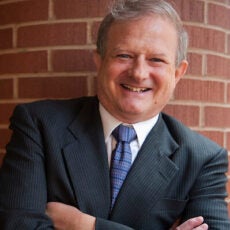
The World Needs a New Gas Technology Center—How About Philly?
The Kleinman Center for Energy Policy welcomes Dr. Fatih Birol, executive director of the International Energy Agency (IEA), to Penn’s campus on Nov. 17. This is an event for our entire city and region to celebrate.
Dr. Birol will receive the second annual Carnot Prize award. The first award went to Pulitzer Prize winner Dr. Daniel Yergin.
The IEA is of great importance to the global energy system. The advanced industrial countries formed the IEA in the 1970s to respond to threats posed by the Arab oil embargoes. These embargoes sought to punish specific nations, including the United States, for supporting Israel in the multiple Arab-Israeli conflicts of that era. Although the embargoes failed to stop oil deliveries to the U.S. or other targeted nations—because of the fluidity of global oil markets and extensive tendencies of OPEC members to cheat on quotas of sales—it did generate high costs for oil throughout the world.
The embargoes also caused consumer panic and changed consumer behavior. People wanted full tanks of gasoline instead of wanting just a few gallons at a time. The long gasoline lines that came to symbolize these embargoes were largely self-imposed problems tied to price controls on the fuel.
The advanced industrial nations recognized the serious economic and geopolitical threats of such embargoes and formed an alliance that developed a response. Key elements of the response included:
- creation of strategic petroleum (crude oil and products) reserves in the member nations,
- formation of the IEA to coordinate the response planning and implementation and,
- building an energy market intelligence capability at IEA to help importing nations prepare for any future interruptions.
One measure of the success of this collaboration through the IEA is the rarity of major disruptions—or even the threat of such disruptions.
The IEA began with the relatively ambitious yet straightforward mission of ensuring reliable, affordable, clean energy for its member countries. The IEA has become one of the world’s most credible sources of energy market and technology information.
Over the decades, IEA’s role expanded. One form of expansion was the establishment of several energy technology centers. These centers were often located away from IEA headquarters in Paris. They addressed specific options for reducing IEA member countries consumption of oil. They addressed building energy technology, clean coal technology, renewables technology, and several other areas.
One particularly noteworthy center was the International Centre for Gas Technology Information. Until the establishment of this center in 1995, natural gas had generally been viewed on the global scene as of secondary importance to the oil markets.
IEA leadership had the then-brilliant insight that more natural gas use generally meant less oil use. The IEA selected a joint proposal by the United States and Denmark (a major player in North Sea natural gas production at the time) to lead this center. The IEA also invited Russia to play a major role in this Gas Technology Center. IEA charged the Gas Technology Center with promoting market penetration of new natural gas technologies on both the production and demand sides throughout the world. It also directed the center to assist governments in developing policies that could positively reinforce the growth of natural gas in the energy equation.
As the first executive director of the Gas Technology Center, I summarized our aspirational intent as “to create a global village for the world’s natural gas industry.” The accelerated progress and contributions of natural gas in the last 20 years cannot all be traced back to this institution. Nevertheless, two particular initiatives had profound positive effects. In September 1994, in the buildup to official establishment of the center, IEA convened a Global Gas Resources workshop in Vail, Colorado. More than 80 natural gas supply experts participated. The Workshop Summary is one of the first technical reviews to give serious attention to the global potential for shale gas. Secondly, this center was the first IEA center to rely aggressively on the “World Wide Web” as the medium through which to conduct business. The Center developed technology information exchanges, forums for experts to create specialized networks, question and answer postings, and a directory of gas service providers. It was a pioneer in terms of creating a net positive cash flow through internet-based activity (although the operating agents did not choose to exploit their leadership there).
As natural gas began to take on a commercial growth trajectory of its own, support for this center declined. The center closed in the early 2000s.
Given three important new developments, I believe it is time for the IEA to re-institute this center and to locate in Pennsylvania.
- The rapid growth of unconventional gas supply, especially in Pennsylvania, and the growing role this fuel is building throughout the world.
- The importance of minimizing methane emissions from natural gas activities in order to maximize the greenhouse gas (GHG) benefits of natural gas. The center addressed gas system tightness as a safety measure before and came up with many shared improvements.
- The opportunity to take advantage of Pennsylvania’s Kleinman Center and other academic centers unusually connected to the business world.
These factors make it feasible for the IEA to quickly revitalize this technology center for the benefit of the IEA’s members and the broader global community.
The IEA recently re-organized its efforts regarding technology innovation into a set of technology collaboration programs. Natural gas, so far, appears to be addressed as part of a rather broad fossil fuel program. It will not realize its full potential in such an approach. It is time to restart the Gas Technology Center—either as a separate entity or as a new IEA Technology Collaboration Programme. With the role Pennsylvania has been playing in the strong growth of this technology, this would be a logical place to locate such an initiative.
William Hederman
Independent Senior Adviser, Deloitte and ToucheWilliam Hederman is a former senior fellow at the Kleinman Center and Independent Senior Adviser at Deloitte and Touche.

